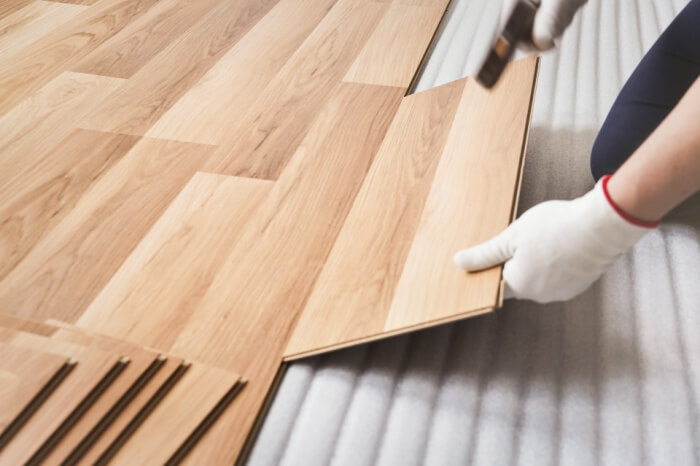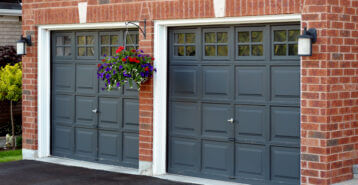Are you doing a flooring project?
Modernize can pair you with three to four pros in your area, so you can compare options and save time and money.
Flooring can make or break a home. There’s not much that could make the interior of a house look more outdated than lime green 1970s shag carpet.
Upgrading your flooring is one of the best ways to increase your home’s visual appeal, comfort, and functionality. It also can modestly increase the value of your home and provide a bit of added “oomph” when it comes time to put your home on the market.
If you have decided it’s finally time to modernize the flooring in your home, you’ll be faced with a host of choices. Not only will you have to figure out what type of flooring best matches your home’s decor and furnishings, but you’ll also have to weigh those options against your expected budget for new flooring. Modernize produced this handy guide to help homeowners like you create and manage a budget for your new flooring project.
Since there are so many different types of flooring from which to choose, we are focusing on hardwood flooring for this guide. However, the steps and processes for creating a budget are the same for other flooring materials— simply change the price per square foot to match your preferred flooring material.
Budgeting for New Hardwood Flooring
Choosing materials for a new hardwood floor is like buying a new car. The sheer number of types of hardwood available to consumers can be a bit overwhelming.
For real hardwood, species such as maple, red oak, and white oak have long been preferred throughout the U.S. because they are plentiful and therefore less expensive. Other popular types of hardwood used in flooring include ash, beech, birch, cherry, mahogany, and walnut — but that’s far from a complete list.
Real hardwood floors on average typically cost about $8 a square foot. However, that number could swing much higher depending upon your choice of materials. Exotic hardwoods — species grown outside the U.S. — include teak, tigerwood, cypress, and pecan, cost much more than domestic hardwood flooring.
To save money, many homeowners budget for engineered hardwood flooring instead of natural materials. Engineered hardwood flooring is constructed using multiple layers of plywood underneath a solid hardwood veneer. This type of flooring typically costs about $6.50 a square foot. Other homeowners choose laminate plank flooring, which is made with compressed medium-density fiberboard (MDF) underneath a thin image layer and top wear layer to achieve a realistic wood appearance. Laminate hardwood wood flooring typically costs around $4 to $5 a square foot including installation and underlayment materials.
Now that you’ve got a basic understanding of your options, it’s time to narrow down your choices. Read on to learn more about how to create a hardwood flooring budget, which requires careful examination of your cash reserves, assets, and potential return on investment.
How to Calculate What You Can Afford for New Hardwood Flooring
Your budget in large part is determined by the total area in which you want to install new hardwood flooring. Upgrading the flooring in your entryway is a relatively minor cost compared to upgrading flooring throughout your living room, dining room, and hallways.
A good first step is to determine the total square footage you’ll need — a good contractor can help you with that. Modernize also can put you in touch with a contractor in your area that can help you choose the types of hardwood flooring that will work best in your home and also fall within your renovation budget.
Find the Right Contractor for Your Flooring Project
Whether you’re ready to begin your project now or need some expert advice, our network of contractors are here to help. With a few simple questions, we’ll find the best local professionals for you
Next, take a look at your income and expenses to determine how much money you might be able to parse out for a flooring renovation project. An experienced flooring contractor also could provide valuable initial insight into project costs.
What is Your Home Equity
The amount of equity you have in your home could play a crucial role in financing a flooring renovation project. Home equity is the difference between what you owe on your mortgage versus your home’s current market value.
Building equity in your home makes you a stronger borrower and increases your purchasing power. If you need to take a home equity loan to finance your project, you could potentially qualify for a larger loan amount at a lower interest rate if you have built up significant equity in your home.
What is Your Credit Rating?
Financial institutions use a variety of factors to determine your eligibility for a home improvement loan, including your credit score, existing savings, purchasing power, and other ongoing loan commitments. Although some programs are specifically designed to help homeowners—like the HomeStyle Energy Program or the Title I Property Improvement Loan—you’ll still have to qualify for a home improvement loan or cash-out refinance.
Your credit score is perhaps the most significant marker of your overall financial health—as determined by financial institutions, anyway. Your credit score “predicts how likely you are to pay back a loan on time,” according to the Consumer Financial Protection Bureau. Companies use proprietary scoring models to calculate your credit score using information from your credit reports, which breaks down your credit usage and current credit situation, such as payment history and the current status of all credit accounts.
Understanding your credit rating and how you’ll be viewed as a responsible borrower can go a long way in determining how much you might be able to borrow as you budget for new hardwood flooring.
Be Real About Your New Flooring Needs
Deciding on which type of flooring is best for your home and budget can be a bit overwhelming. In addition to insight from professional flooring contractors, homeowners can turn to Modernize for even more help and insight.
Your contractor can help you come up with a solid plan for your flooring renovation project. For many, that plan likely will be a compromise between new flooring cost and affordability. The key is to communicate your priorities, expectations, and new flooring budget with your contractor of choice.
Establishing clear lines of communication between homeowners and contractors can help create stronger working relationships based on mutual trust. Be sure your contract understands any financial limitations you might have so he or she can suggest the right kinds of materials and scope for your new flooring project.
Find the Right Contractor for Your Flooring Project
Whether you’re ready to begin your project now or need some expert advice, our network of contractors are here to help. With a few simple questions, we’ll find the best local professionals for you
Reviews from Real Homeowners
Welcome to Homeowner Resources! We are the Modernize blog. Modernize pairs more than 3 million homeowners a year with pre-vetted contractors in their area. This blog started because we believe homeowners should know everything about their homes, from how their HVAC works to which front door colors they might love. On Homeowner Resources, you can find information on every part of your home, right down to how you can negotiate with contractors to get the best price. Here's more about the blog.
Need a contractor? Learn more about how Modernize finds the right pro for you.




